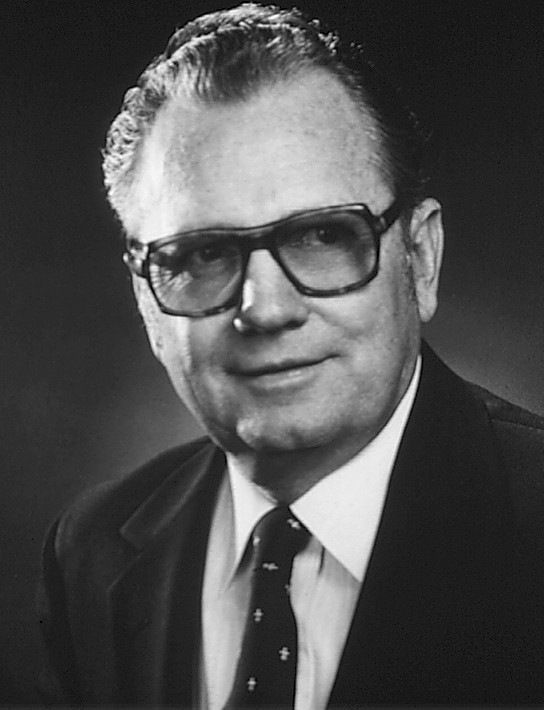Don Barton, former director of Cornell AgriTech, dies at 100
By Krisy Gashler
Donald Barton, a professor emeritus of horticulture whose 22-year tenure as director of Cornell AgriTech is remembered as “the golden years” because of his thoughtful, collaborative leadership, died Oct. 7 in Canandaigua, New York. He was 100.
Barton, who joined the Cornell faculty in 1951, served as the ninth director of the New York State Agricultural Experiment Station in Geneva – now known as Cornell AgriTech – from 1960 until his retirement in 1982. He oversaw a slew of capital projects, leading efforts to renovate two buildings and construct four new ones, including the Entomology-Plant Pathology Laboratory, which the university named Barton Laboratory in his honor in 1983. He also acquired several properties as research farms, and prioritized establishing relationships with growers, industry leaders and state officials.
“The capital projects that Don advocated for and made happen are lasting impacts of his legacy,” said Jan Nyrop, the Goichman Family Director of Cornell AgriTech. “But even more important than the physical legacy Don left behind is his legacy of leadership style and cultural perspective.”
According to a history of “The First 100 Years of the New York State Agricultural Experiment Station at Geneva, NY,” Barton – unlike some of his predecessors, who maintained a posture of independence from Cornell – recognized the benefits of complementing the work of the university. Nyrop said this shift in approach is among Barton’s biggest legacies.
“Honestly, were it not for the attitude and mindset that Don exemplified and we directors after him have continued to emulate, I’m not sure that Cornell AgriTech would have the support of Cornell CALS that it has now,” Nyrop said.
Barton also prioritized establishing strong relationships with vegetable growers, food processors and state officials responsible for funding that could benefit AgriTech research. For example, Barton led the expansion of research into grape and wine, supporting development of new varieties and encouraging passage of New York’s 1976 Farm Winery Legislation, which enabled the blossoming of New York’s now-thriving farm winery industry.
He also oversaw the purchase of four properties that remain critical to AgriTech’s research: the 108-acre Vegetable Research Farm, the 33-acre Lucey Farm, the 19-acre Highland Research Farm and the 3.5-acre Wellington property.
In addition, Barton recognized the value of cross-disciplinary collaboration, Nyrop said. Faced with an opening for an entomology researcher in the early 1960s, Barton instead hired a chemist – Wendell Roelofs – who became the first researcher to describe insect sex pheromone structures and their role in insect communication and protection.
“Pushing the disciplinary boundary a bit, being willing to take that chance – that was unusual, especially at that time,” Nyrop said. AgriTech has worked to continue that successful pattern, Nyrop said, most recently by hiring an engineer in horticulture, Yu Jiang, whose work in agricultural robotics and artificial intelligence is enabling breakthroughs in the study of plants.
Barton also championed efforts to conserve fruit, nut and vegetable germplasm, co-authoring a groundbreaking paper on the need for national repositories of important crops, and enabling the creation of U.S. Department of Agriculture repositories for more than 30 crop species on the AgriTech campus, said Bruce Reisch, professor in the School of Integrative Plant Science’s Horticulture Section and Plant Breeding and Genetics Section at Cornell AgriTech.
“Dr. Barton was the station director when I was hired and a true mentor to me as well as many others at Cornell and around the world,” Reisch said. “He was a wonderful scientist, a leader with a vision and an extraordinary human being. My condolences go to his family and friends. He will be fondly remembered.”
Donald Wilbur Barton was born June 12, 1921, in Fresno, California. He earned a B.S. in plant science in 1947 and Ph.D. in genetics in 1949, both from the University of California, Berkeley. His education was interrupted by World War II; he served in the U.S. Air Force from 1943-45. A bombardier on 20 missions, Barton was captured by the Germans and held prisoner for about a year after his plane was shot down. He earned the Air Medal with two clusters, the Purple Heart with two clusters and the Prisoner of War Medal. In 2019 Barton was inducted into the New York State Senate Veterans Hall of Fame for the 54th Senate District.
He came to Cornell in 1951 as an associate professor in the Department of Vegetable Crops at AgriTech. His research focused on pea and sweet corn breeding projects, especially developing disease-resistant varieties. Barton was an expert in agricultural research management, and following his retirement he served as a consultant around the world.
Barton‘s family has asked that memorial gifts in his name be made to the Cornell AgriTech Summer Scholars Research Program or to The Presbyterian Church in Geneva.
Krisy Gashler is a writer for the College of Agriculture and Life Sciences.
Get Cornell news delivered right to your inbox.
Subscribe

